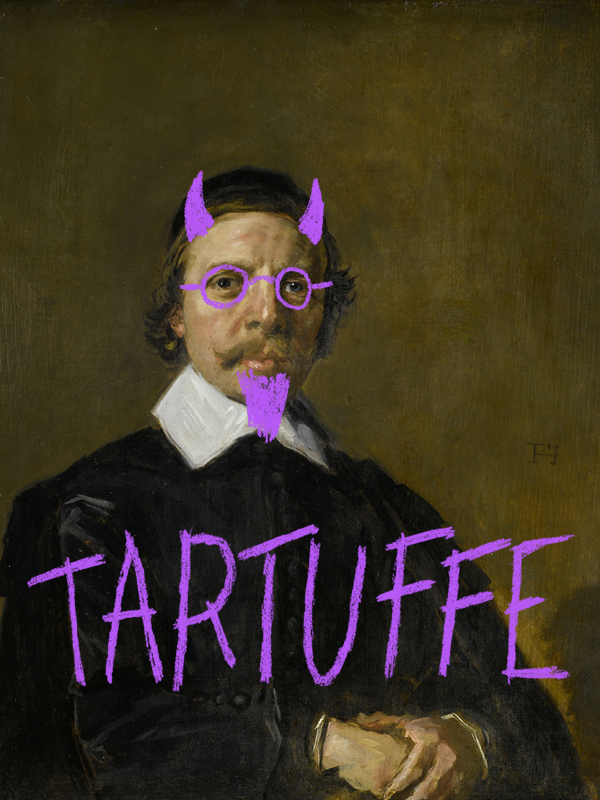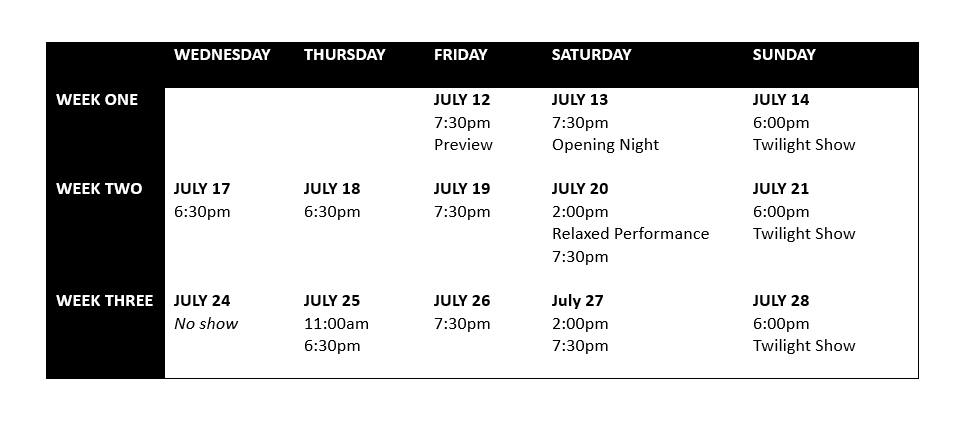
TARTUFFE
By Molière
Directed by Rebecca Murphy
“You see him as a saint. I’m far less awed;
In face, I see right through him. He’s a fraud.”
Orgon is a man who has it all: wealth, influence, happy children, and a doting wife. But when he falls under the spell of Tartuffe, the charismatic spiritual leader (or hypocritical fraud, depending on who you ask), he begins to lose his grasp on it all.
First performed and then speedily banned in 1664, Molière’s Tartuffe is a side-splitting satirical exploration of greed, seduction, piety, and deception.
TICKETS
School groups – $25 (1 free for teacher/s per 10 tickets. To organise your booking please contact education@qldshakespeare.org
SEASON DATES & TIMES

VENUE
PIP THEATRE
20 Park rd, Milton Brisbane 4064
AGE/ GRADE RECOMMENDATION
Gr. 10 – 12
RUNNING TIME
approx. 120 mins
THEMES: Hypocrisy, religion and morality, reason vs. emotion, family, appearances and beauty, ambition, justice, loyalty.
CURRICULUM CONNECTIONS
Tartuffe, the most controversial work of French neoclassicist Molière, addresses the danger of religious hypocrisy through the actions of the titular character. Within the house of Monsieur Orgon, ever ruled by his overbearing mother Madame Pernelle, the duplicity and trickery leads to the fracturing of the household through the actions of the fraudulent imposter, Tartuffe. The production uses the dramatic conventions of Neoclassicism, such as decorum, verisimilitude, and the unity of time, place and action as outlined by Aristotle, known as the classical unities. Through the ridiculing of Tartuffe, irony shines a light on such people within wider society, and encourages audiences to reflect on how such people impact their lives.
DRAMA
Styles & Form
Satire (Horatian-style)
Comedy (Farce, Comedy of Manners)
Neoclassicism
Dramatic Conventions
Aside
Decorum
Five-act structure
Linear narrative
Purpose of drama
Unities of time, place, and action
Verisimilitude
Stylised Movement
ENGLISH
Comparison of texts around similar themes (works by Racine or Corneille, or other literary styles within the Neoclassical movement).
Poetic structure (verse, alexandrine rhyming couplets).
Translation and transformation (see original versus modern translations).
SENIOR CURRICULUM LINKS (QLD)
GENERAL DRAMA
Unit 1 – SHARE: Students will explore the importance of drama to tell stories and share understandings of human experience. A hybridity of conventions and forms as well as a linear approach to storytelling will be explored.
Unit 3 – CHALLENGE: Students will explore how drama can be used to challenge our understanding of humanity over time. Investigate how dramatic form can be used to express philosophical and political viewpoints in action in society.
Unit 4 – TRANSFORM: Students explore inherited theatrical traditions and key dramatic works of the past as a springboard. Influential inherited theatrical traditions that have shaped and informed current dramatic practices in conjunction with emerging dramatic practices will be re-imagined, adapted, and transformed.
DRAMA IN PRACTICE APPLIED SYLLABUS
CORE TOPIC 1: DRAMATIC PRINCIPALS
These principles are realised in dramatic practices through the planning, creating, adapting, producing, performing, appreciating and evaluating of their own and others’ dramatic works and processes in authentic situations.
PURPOSES AND CONTEXTS: Purposes and contexts work together to provide intent and frame the dramatic action and meaning. Includes dramatic, real and general contexts.
PRODUCTION ELEMENTS AND TECHNOLOGIES: Dramatic action and meaning is created and enhanced by production elements and technologies. Includes the applied theatre technologies such as stage management, design, music, lighting, sound.
ELECTIVES: Acting (stage and screen), directing, technical design and production, theatre through the ages.
GENERAL ENGLISH
Unit 1 – PERSPECTIVES AND TEXTS: Students explore individual and/or collective experiences and perspectives of the world through engaging with a variety of texts in a range of contexts. In responding to texts, students analyse the perspectives and representations of concepts, identities and/or groups in texts and how these shape their own and others’ ideas and perspectives.
Unit 3 – TEXTUAL CONNECTIONS: Students explore connections between texts by examining representations of the same concepts and issues in different texts. By examining texts in relation to other texts, students are offered opportunities to explore how connections between texts contribute to meaning-making.
Unit 4 – CLOSE STUDY OF LITERARY TEXTS: Students explore the world and human experience by engaging with literary texts from diverse times and places. They explore how these texts build a shared understanding of the human experience and through this become part of a cultural heritage.
LITERATURE
Unit 1 – INTRODUCTION TO LITERARY STUDIES: Students develop knowledge and understanding of the ways literary styles and structures shape how texts are received and responded to by individual readers and audiences. Students study a range of literary forms from various contexts and consider how textual choices engage readers imaginatively, emotionally and critically.
Unit 3 – LITERATURE AND IDENTITY: Students develop knowledge and understanding of the relationship between language, culture and identity in literary texts. Through critical analysis, students consider how texts endorse, challenge or question cultural assumptions.
Unit 4 – INDEPENDENT EXPLORATIONS: Students demonstrate increasing independence in exploring, interpreting, analysing, and appreciating the aesthetic appeal of literary texts and the insights they offer. Explore how the dynamic nature of literary explorations and interpretations, and how a close examination of structure, style and subject matter of literary texts supports various responses.
GENERAL CAPABILITIES
Critical and Creative Thinking: “seeing or making new links that generate a positive outcome” or “generating open- and far-mindedness” or “inquisitiveness.”
Ethical Understanding: Students learn to develop ethical understanding as they explore ethical issues and interactions with others, discuss ideas and learn to be accountable as members of a democratic community.
